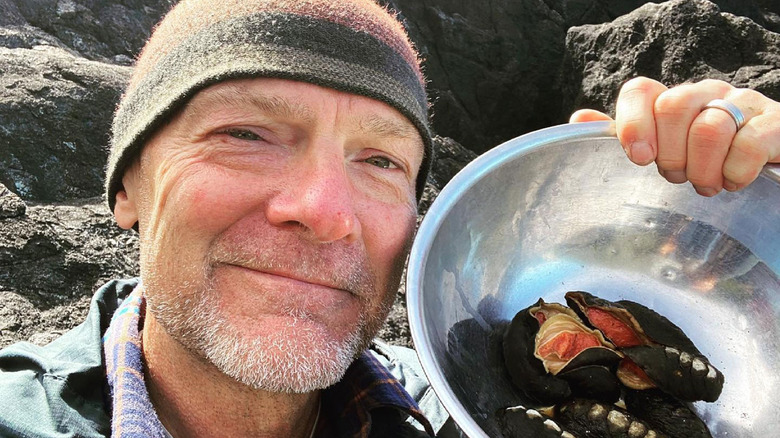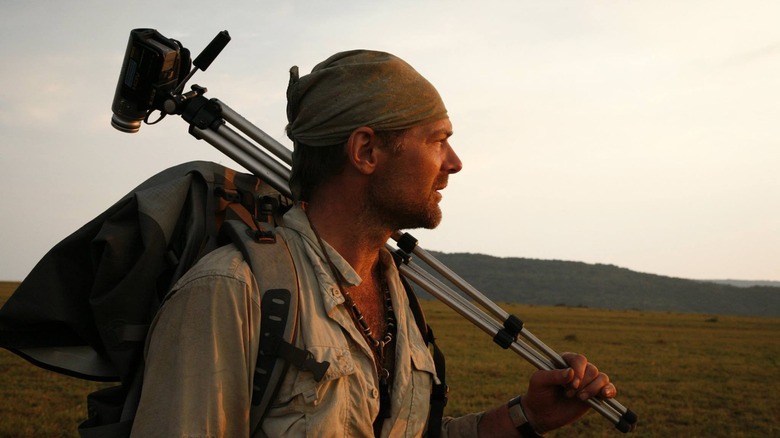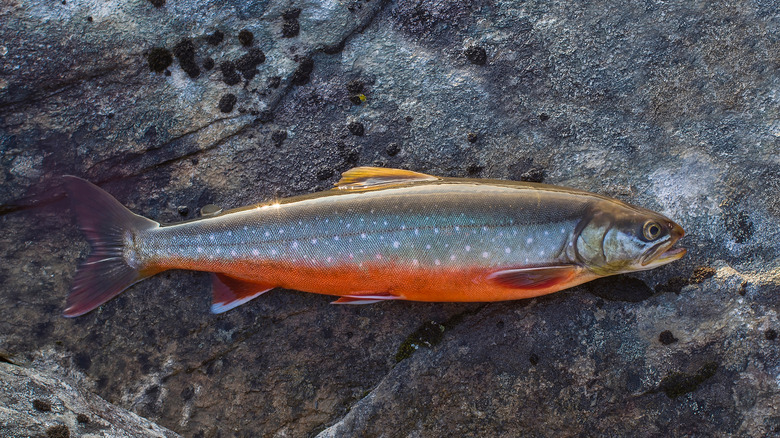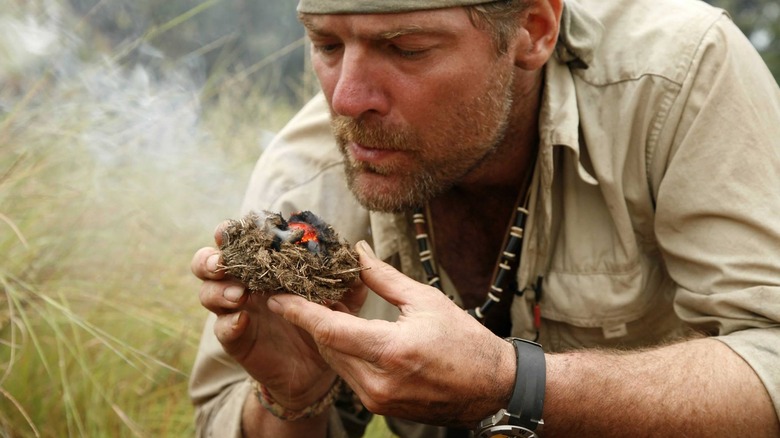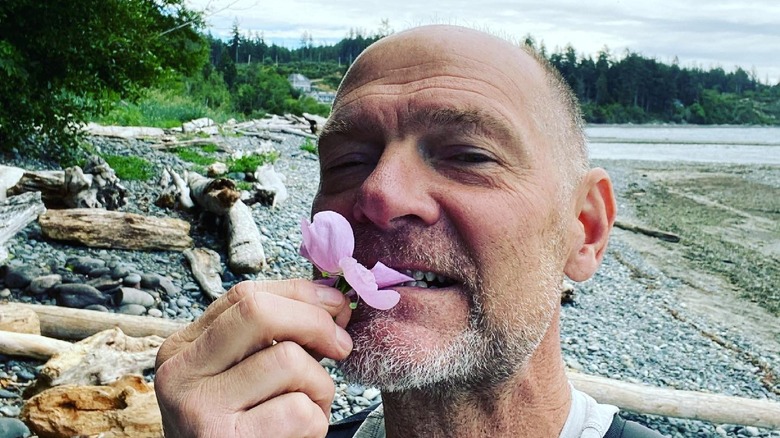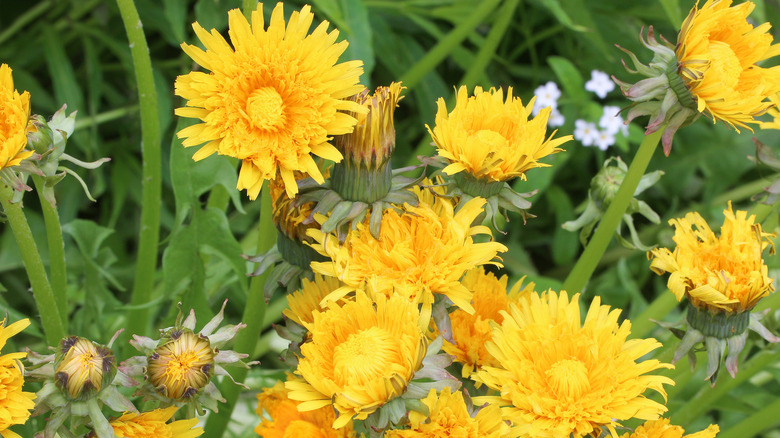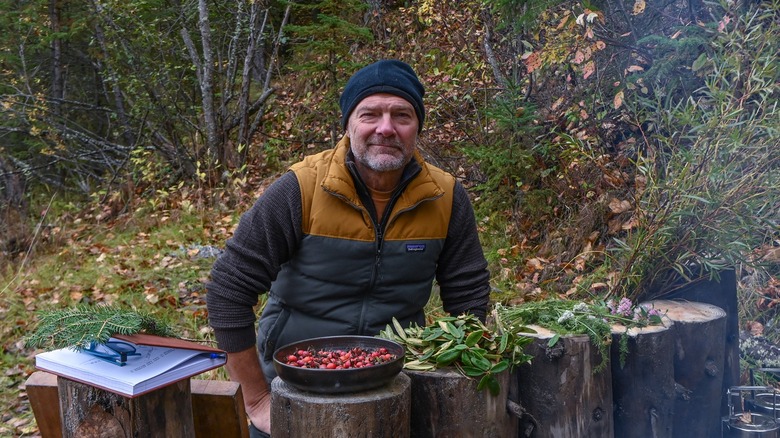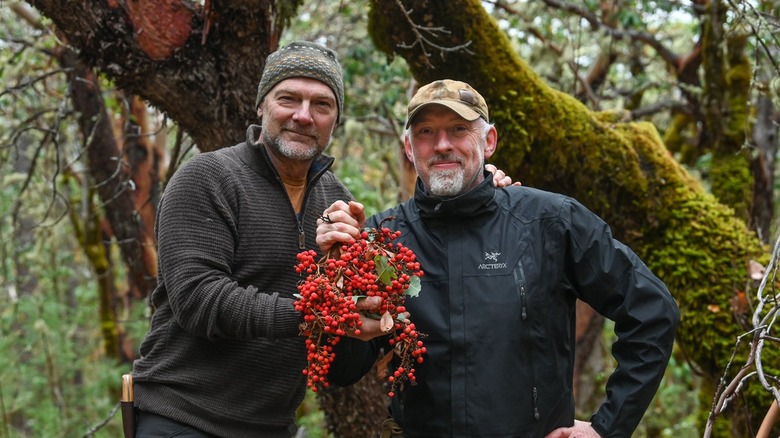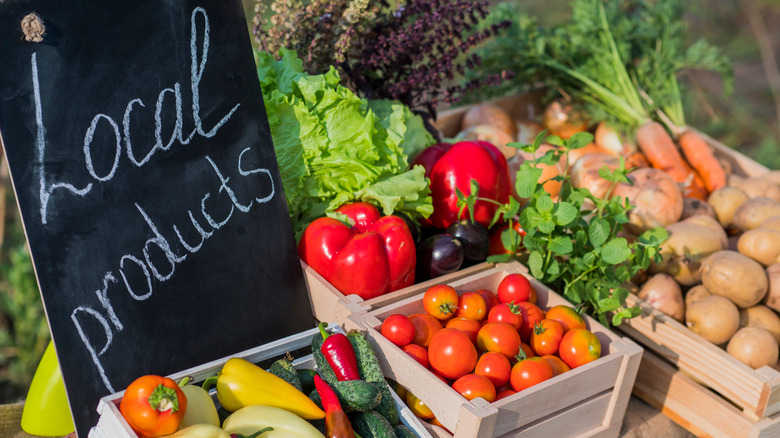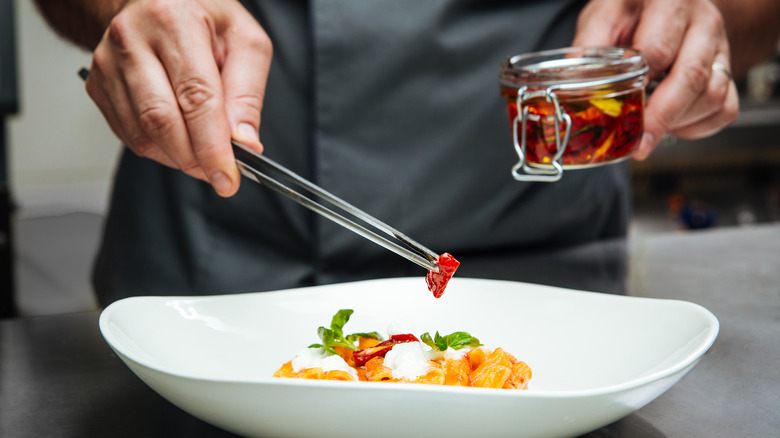Survivorman Les Stroud Talks Wild Harvest And Finding Food In The Wild - Exclusive Interview
Without Les Stroud, the creator, producer, editor, cameraman, and star of the show with which he himself has become almost synonymous, the multi-season hit "Survivorman," there may well have never been the survival-oriented category of television programs we have today, including Bear Grylls' "Man vs. Wild," the hit CBS show "Survivor," and all the other programs that have essentially pitted human perseverance against a beautiful but often inhospitable natural world.
And there certainly would not be Stroud's latest book, "Wild Outside: Around the World with Survivorman," his first work directed expressly at a young audience, or the show "Wild Harvest," in which Stroud and professional chef Paul Rogalski range out into the wilderness to forage for a bounty of food they then cook up into works of culinary perfection. Okay, with the occasional gastronomic misstep, as Stroud shared during a recent interview with Mashed.
Originally envisioning a life as a musician — and indeed he does write and perform his own music prolifically — ultimately Les Stroud's passion for the wild won out and led to a career as varied as the foods for which he forages, fishes, or hunts, whether during a "Survivorman" survival ordeal or to help Chef Paul prepare a three-course meal cooked al fresco on a beach. Stroud is a writer, filmmaker, musician, de facto chef, and as it turns out, he is an inspiration to people of all ages, as he himself learned from a most unlikely source: Halloween.
Les Stroud on his new book for kids
Where did the idea for a book about wilderness survival come from, and how has the reception been so far?
Well, the book is going fantastic, actually. It's been incredibly well-received. The whole idea for it was based on the fact that for a lot of years, "Survivorman" has been followed very strongly by kids all over the place. I used to get actually Facebook posts of kids dressing up as me for Halloween. So I always figured, well, that's a pretty darn good endorsement right there, if they're going to do that. And then really, writing "Wild Outside" with Annick Press gave me an opportunity to speak directly to kids rather than have them following my "Survive" book, or my "Survivorman" series, which is sort of ostensibly done for adults, but kids love it anyway. Now I was able to write a book and say: "This is just directly for between me and you guys." And it's an opportunity to share my adventures and stories with them, teach them some lessons through them, and also give them some ideas for getting out there themselves.
Have any kids reached out to you after having read it?
Absolutely. I've got kids who've done every single activity in the book, and [done them] with their parents and without. And so, yes, lots — I check the social media, so I get a lot of social media feedback for it.
The best meal Survivorman Les Stroud ever ate in the wild
What is the best meal you ever prepared for yourself while undertaking a survival ordeal?
Oh, that's easy. Arctic char. I was up in the high Arctic, and I was down without food for about four or five days. It could be, I think five days. And on the fifth day ... the way I'd set up the scenario was that I was a stranded fisherman, so I had gear with me. Doesn't mean the fish are there, or that they're biting. So for five days, they didn't. So that's five days without food, just water, little nibbles here and there, not much of anything. And then on the fifth day, a school of Arctic char came through, and I caught four in a row, and they were all big. And I sun-dried them. And that was the most amazing survival meal I've ever had, bar none.
And what is the first food you tend to enjoy after a survival outing?
Well, the thing I dream about tends to be pizza. And the reason for that is actually more scientific. I think it's scientific anyway, at least biological in some way. I believe that what happens when I'm out there is there's such a lacking in intake of fat, that what I start to crave is fat, anything fatty. I want, really want, that energy source. And so, what does my mind think about when I think about that? I think about melted cheese, and I'm thinking about pizza. So I often really daydream about just the best, thickest, cheesiest pizza I can come up with. So then when I come out, generally speaking, I always would tell my crew: "Hey, when I'm done with my week out there, beer and pizza. Make sure there's a beer and pizza waiting for me."
Les Stroud's expert tips for campfire cooking
What are some tips you have for campfire cooking?
Well, I think one of the keys is the perfect fire. Naturally, with a guy like me, you'd think, okay, that's going to be something that I would go to. And I do, because if you can set up the perfect fire with the right sort of areas and the right heat capture and where the coals are going to be, then that enables you to cook well over top of that fire. And I always say ... have a good pair of gloves. And when you get there, just remodel that fire pit, because most people just destroy it and make a silly fire pit. But you can make it for cooking. So that's a bit of advice I give is take the half an hour and remodel the fire pit, so that you can really cook well on your farm and go from there.
And then the next thing is just like cooking in a kitchen, it's all about time and preparation, space to work. You don't want kids ... well, not kids. Adults too, in a camping situation. Boy, if there's one thing that ever drives me nuts is to have everything laid out on a little tarp, fire going, [and I'm] ready to make this nice dish, and I do not understand to this day why people think it's okay to step over top of the food. It's like, you've got a whole forest to walk in. Why do you have to walk and step over top of the food? You just flicked pine needles up into the salad, right? That kind of thing. So there's some advice for you, advice you probably didn't expect [to] get, but there you go.
Les Stroud on the challenges of wild foraging
What is something that you wish more people understood about finding food in the wild?
That it's incredibly difficult, that whatever you see on television and in films is not the way it really is when you get out there. So often the misunderstanding is, "Oh, you're going to be there? Oh, you'll be fine. You just gather blueberries." Sure. If I'm there for the 11 days that the blueberries are ripe and ready to be picked and eaten. People don't understand that it's all about seasonality, whether or not something is ready.
I think a big misunderstanding is, well, let me put it this way: Do we all know somebody who is allergic to a particular food source such as peanuts? Sure we do. And in some cases deathly so. Okay. Remember that about wild foods. You can't just grab and eat something you've never eaten before. You got to make sure you're not allergic to it. Just like if you were allergic to peanuts, it's the same thing. So yeah, I think there's a lot of misunderstandings when it comes to getting wild food out there. But the biggest of all is that it's just all there and that it's all readily at hand. And that's not the case. It's often quite a search.
The wild foods that are easiest to forage for, according to Les Stroud
Are there any wild foods like that can be found almost anywhere in North America?
Yeah. My favorite of all is the cattail. Cattail has an edible part to it in every season of the year — even in the winter, you can dig down and get next year's growth, if you can break through the ice or whatever you have to do. But cattail is definitely a big go-to for me for easily accessed [forage]. And the beauty of the cattail? We call it nature's supermarket, simply because you don't find one cattail. You generally find a few hundred. And a few hundred will feed you really quickly, so that's a big favorite of mine.
Then [there's] dandelion. That's an obvious. And there are other things that are right in front of people's faces all the time. So many different kinds of berries, but even rose hips. Rose hips are often readily available. They have a seasonality to them, but just the same. I like those types of plants that when you find them, you find lots of them, they're abundant. So you can harvest ethically and feel good about what you're picking.
And then lastly, I'll just put an addendum onto that and say that also discover and find out which invasive species are wonderfully edible. Because the invasive species, you can have a guilt-free gathering if you will. And just like, oh, these are invasive anyway. And you want to get rid of them. Of course, you have to learn what those species are. Of course, let's remember one thing: many plants were brought here a long time ago. We think they're part of here, and they're not. Dandelions were brought over. So there's a lot of plants that were brought over that they just exist. And they're so prolific. The prolific and abundant plants, it's the best thing to find.
Les Stroud's favorite forage finds
What's a foraging find that has most excited you when you were out in the wild?
I guess in a "Survivorman" mode, a foraging find that I really enjoyed were the strawberry pincushion little fruits from that cactus, from the pincushion cactus in Arizona. That was a really wonderful find, because man, they were just delicious. And then with "Wild Harvest" and taking chef Paul Rogowski out there and looking around, I want to say — well, we gather so much. So I have to say I'm quite happy that we've done, for example, mussels in the show on the West Coast. So gathering mussels was a real nice treat. And recently, we did gooseneck barnacles. That was a new one for me to learn.
But I think in terms of the plants, there's the standard go-to plants, but you know what a great one that I love and that so few people ever experience? It's called creeping snowberry. So that's a big favorite of mine. That is more from the boreal forest. So you got to think a little further north, like in [the "Survivorman"] episode up in Temagami, Ontario. But creeping Snowberry is wonderful.
Les Stroud talks about his latest show Wild Harvest
Where did the idea for the show "Wild Harvest" come about? Is it something that you'd been germinating for years?
Germinating for years, based on casual conversations that Paul Rogowski and I had. He started a conversation down in Mexico one day, when we met down there and he said: "We should try to do something together." and I said "Yeah, I could go and forage, and you could cook. Yeah." And then five years goes by. And then we got together again — or longer than that, maybe eight years — and we get together in a pub. I was on my way through Calgary, and we started talking it up again. But this time we put a little motivation behind it and a little more creative thought behind it. And that's how it came about, just the two of us chatting it through.
What have been some of the biggest surprises and the best moments from "Wild Harvest"?
Biggest surprises would be, well, I had no idea how talented Chef Paul Rogowski was at plating a meal. He takes something, all these different foraged edibles — I know them from the world of survival, I don't know them in the kitchen — and he turns them into this artistic masterpiece that is not only just beautiful to look at, you just want to photograph it, it's one of those "Man, I got to take a picture of this" things, And then you eat it, and it's amazing. So I think that's been a surprise for me.
I really wasn't expecting him to be ... I should have, I suppose, but I didn't go into his restaurant in Calgary. He's got a restaurant called Rouge in Calgary. I didn't go in there going, "Let me see how your plates look." I just assumed he'd do something cool. He's over-the-top though with it.
And I think the greatest moments we have are — Okay, I'll add in here and say, one of the fun moments is when he doesn't get it right. Because in "Survivorman," I like to show people when you don't get it right. Then they understand that when you get it right, you really are getting it right. It's not just playing it up for the cameras. And once in a while, Paul won't get it right. And I'll say, "You kind of missed on this one." And we leave that in. So that's a little fun moment, but my favorite moments, I suppose, are when I sit down and everything comes together. He made an amazingly beautiful dish. It tastes out of this world. It's the specific ingredient that we wanted to highlight, like say fireweed, or horsetail. And all that sitting there. And now I'm getting really nuanced here, the overall flavor matches the terroir. If all that comes together, that's an amazing moment."
Les Stroud on sustainable eating
How people can be more sustainable in their own eating habits, whether that's when they're foraging for food, or even just going to the grocery store or a restaurant?
Kick the grocery store habit, kick the habit of long-distance food, and really discover local food. I'm speaking to you from an office space that's up above a food co-op. And the whole mentality, if you will, the belief system that have you behind the food co-op is that everything's local. As much as they can make a local, they go local. And I understand avocados don't grow in Ontario, Canada. I understand oranges don't grow in the Arctic. I get that. But nonetheless, I think the big thing is kicking the long-distance habit. And I'm not suggesting that I'm a purist or that we become purists about it. I'm saying do the best you can.
I balance my life between the States and Canada. And in the wintertime in Canada, how can I eat local? Well, if I want to eat meat, I can. There's meat providers and fish providers that I can deal with locally. In the spring and summer, I can eat a lot of vegetables and fruits locally in Ontario, Canada. When I'm down in the States, say in Southern Oregon, honestly, I almost have no excuse. If you live down in those Southern belts, you almost have no excuse. You can really explore the local fare. And let's face it. That brings profit and life-sustainability to the local farmers. This is a big thing.
Now, the gathering thing that I'm showing, honestly, I don't expect everybody to all of a sudden pick up a bucket and go out and start gathering for their kitchen. Not at all. Rely on those local farmers and then augment your wonderful meals by learning the local foraging. So I know that when I'm down in Oregon, I know I can harvest Oregon grapes and Madrone berries and Manzanita berries and mustards and on and on I can go.
And I know when those seasons are. For example when I harvest my crab apples — every year I have eight to a dozen, large canned jars of crab apple jelly. I don't need to go buy something at that Safeway [because] I make it. And that was one enjoyable afternoon on a ladder with the crab apple tree, one enjoyable evening with a glass of wine and my wife cooking up the crab apple jelly, and boom, I got our toast and jelly covered for the year. You see what I'm saying? So that's a great augmentation, but I definitely, highly, highly recommend supporting your local food producers, whatever they may be, meat or vegetable.
Les Stroud's favorite foods and why he has no tolerance for shaved coconut
Do you have a favorite cuisine in general?
Yeah. I've become a food snob over the years. And my favorite cuisine is really nicely done food. It's been a while since I've gone somewhere — well, I was in a roadhouse a little while ago. I had a big burger, but I also knew this roadhouse, Climate Burger in Grants Pass. I knew they made great burgers, so no problem. Yeah, [it's the] 'I'm old enough to like jazz" kind of comment. I'm old enough to enjoy really nicely prepared food. I don't want to say "fine dining." That's misleading. I just mean well-prepared, great food. So that's my cuisine, well-prepared, great food. As far as exactly what, doesn't matter.
Is there one food you could eat multiple times a week and just never get tired of it?
It's a really off-color way to answer your question and why I highly avoid it now. And we all have our own little addictions. Mine's peanut butter. I spent my college years living off peanut butter. I mean, that's just something that's maybe a weird way to answer your question. Maybe a more fun way to answer your question, I suppose, if I was trying to be a little more healthy about it, probably fish. I really enjoy my fish.
Is there a food you would just as soon never eat again?
I'd have to turn to what I actually don't like, which isn't much, but I can't stand shaved coconut. I'm not sure if I could eat that to survive. It's like when Jim Gaffigan talks about seafood, which I love seafood, shell food, and all of that, but I feel the same. I'm like: "I don't get it. Why are you people eating hair?" It feels like you're eating hair when you eat shaved coconut. So for everything that I like to eat in this world, if you put you shaved coconut, no. And I can sense it in any [dish] It's like: "There's shaved coconut in this? 'No, no, there isn't.' Oh yes, there is." And it's like, "You see? It's at the bottom of the list, but it's still in here." So yeah, I could go without that. I'll be facetious and say it should be banned.
Check out Les Stroud's new book "Wild Outside: Around the World with Survivorman" and look for new episodes of "Wild Harvest" on your local PBS station.
